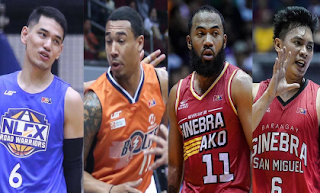The definition of free agent refer to a professional athlete who is not under contract and is free to auction off his or her services and sign a contract with the team that offers the most money.
The Philippine Basketball Association (PBA) doesn't have that. Not right now anyway. It will only have a genuine free agency market only on 2021 and it covers not all players.
After almost a year of deliberations, the PBA Board finally decided in 2013 to make free agency a reality in the pro league. However, it agreed that the unrestricted free agency rule will only cover the rookie draft class of 2014.
A check with the PBA office confirmed that all players who came in before that class will remain covered by the old free agency rule, which, in reality, isn't free agency based on the true meaning of the words.
Why?
Under the old rule, teams retain the right of first refusal on players with expired contracts, meaning they can simply match any offer sheet from other ballclubs to retain the right on their free agents.
If a player decides to sit out or play in another league, as was the case with Asi Taulava and Meralco a few years ago, his mother team needs only to make a qualifying offer not lower than his salary in the final year of his old contract to retain the right on the player in perpetuity.
For a player to become an unrestricted free agent, he must be dropped unconditionally by his mother ballclub, which rarely happens, more so for star players.
That finally changed when members of the PBA board, late in the term of former commissioner Chito Salud, approved unanimously a rule that makes a player an automatic unrestricted free agent at the end of his seventh season in the pro league.
"Historic 'yan dahil mga talagang free agents na ang mga 'yan," said veteran player agent Danny Espiritu, who has negotiated contracts on behalf of hundreds of players for three decades.
"Dati, kahit expired contract ka na, may right pa rin sa iyo ang mother team mo. At kahit mag-sit out ka pa ng ilang taon, the team still keeps the rights on the player," he added.
Problem is, the landmark rule was enforced beginning with the 2014 draft class and isn't retroactive, according to a top PBA official. That means players who came in before that rookie class will never benefit from the rule - and will never become UFAs unless they are dropped unconditionally by their mother teams.
The 2021 batch of free agents may not be palatable mostly because of their age, but the 2022 crop of players is more appealing counting Scottie Thompson, Troy Rosario, Chris Newsome, Mo Tautuaa and Maverick Ahanmisi among its members.
The Philippine Basketball Association (PBA) doesn't have that. Not right now anyway. It will only have a genuine free agency market only on 2021 and it covers not all players.
After almost a year of deliberations, the PBA Board finally decided in 2013 to make free agency a reality in the pro league. However, it agreed that the unrestricted free agency rule will only cover the rookie draft class of 2014.
A check with the PBA office confirmed that all players who came in before that class will remain covered by the old free agency rule, which, in reality, isn't free agency based on the true meaning of the words.
Why?
Under the old rule, teams retain the right of first refusal on players with expired contracts, meaning they can simply match any offer sheet from other ballclubs to retain the right on their free agents.
If a player decides to sit out or play in another league, as was the case with Asi Taulava and Meralco a few years ago, his mother team needs only to make a qualifying offer not lower than his salary in the final year of his old contract to retain the right on the player in perpetuity.
For a player to become an unrestricted free agent, he must be dropped unconditionally by his mother ballclub, which rarely happens, more so for star players.
That finally changed when members of the PBA board, late in the term of former commissioner Chito Salud, approved unanimously a rule that makes a player an automatic unrestricted free agent at the end of his seventh season in the pro league.
"Historic 'yan dahil mga talagang free agents na ang mga 'yan," said veteran player agent Danny Espiritu, who has negotiated contracts on behalf of hundreds of players for three decades.
"Dati, kahit expired contract ka na, may right pa rin sa iyo ang mother team mo. At kahit mag-sit out ka pa ng ilang taon, the team still keeps the rights on the player," he added.
Problem is, the landmark rule was enforced beginning with the 2014 draft class and isn't retroactive, according to a top PBA official. That means players who came in before that rookie class will never benefit from the rule - and will never become UFAs unless they are dropped unconditionally by their mother teams.
The 2021 batch of free agents may not be palatable mostly because of their age, but the 2022 crop of players is more appealing counting Scottie Thompson, Troy Rosario, Chris Newsome, Mo Tautuaa and Maverick Ahanmisi among its members.


No comments:
Post a Comment